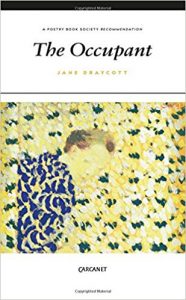The Occupant
 Jane Draycott’s words have always encapsulated a timeless beauty with a charm which is somehow both otherworldly yet unmistakably rooted in our earth. In this her fourth collection of poems, following 2009’s Over, she continues in this vein. “It seems like forever”, she writes in the collection’s titular poem, “We are going to tame the clouds and the sea. I cannot wait”. Dreamy verse emerges from earthly realities; the ebb and flow of life runs throughout.
Jane Draycott’s words have always encapsulated a timeless beauty with a charm which is somehow both otherworldly yet unmistakably rooted in our earth. In this her fourth collection of poems, following 2009’s Over, she continues in this vein. “It seems like forever”, she writes in the collection’s titular poem, “We are going to tame the clouds and the sea. I cannot wait”. Dreamy verse emerges from earthly realities; the ebb and flow of life runs throughout.
Draycott’s background in Medieval and Renaissance English literature reverberates in references and inspirations. In “Lost”, she quotes Hermione from Shakespeare’s The Winter’s Tale. Famously, Hermione dies then is resurrected – whether this is a supernatural occurrence, or simply trickery is left ambiguous in both the play and poem, but the supernatural is suggested when Draycott states, “The wonder is the waking world is so much like the dream”. The beauty of the everyday is graceful and stark in ways we often overlook, but through her short, punctual verse magnifying small details, she encourages mindfulness. Her sparse sentences cast her as curator of the small details of her shared world.
In the depths of murky waters Draycott sees our beginnings, “green water frozen from the dawn / of time, smelling of the dark and plankton // micro-organisms from which we all descend”. By setting the last line apart, she drives home her emphasis on our status as interconnected beings. Her poetry is as much about nature itself as it is of human connectivity to nature. This is again considered in “Lent”, where she calls for “no more/ obsessive checking of your phone/ like the pulse of a dying friend. Refrain”. In this succinct two stanza poem, Draycott plays with contrast, both expressing the command and the resulting freedoms. Also, by contrasting cold, unfeeling technologies with emotionally evocative, heartfelt warmth, she encourages us to pay attention to where the natural world ends and technology begins, and perhaps decide which on side of the divide we are more closely aligned.
Lessons can be learnt too from nature’s frequent simplicity. “At the Ice Pits” closes with a powerful standalone statement, “The mountains do not care how beautiful they are”. In a society so geared toward pinpointing so-called flaws – in women especially- as a way to sell products, this is refreshing. We are inevitably inclined to absorb, even on a subconscious level, the often demoralising messages projected. But here, Draycott conceptualises a utopia where things could be otherwise. What if we identified more with mountains and valleys than we do with consumerist ideals? Perhaps that sounds ridiculous, but if the impractical cannot at times find a home in poetry and the arts, where else will it reside?
The closing line of “This Storm” had perhaps the collection’s most significant impact on me, yet it is a seemingly throwaway at first glance: “Hearing of your death today has got me thinking about how much I liked you”. The stark simplicity of this line handles death in a way which recognises the inevitable. Yet these are not unfeeling words – nor is that state wholly terrible; it just is. Draycott draws a fitting tribute which both honours her grief, while accepting death’s inevitability. We cannot transcend our earthly confines, and perhaps that’s okay.
Nature, the medieval, dreams and reality flow together and make readers feel part of something larger than ourselves. In “Sleep”, she speaks of how the “whole town dreams the same dream”. Indeed, The Occupant make us feel we are not only dreaming the same dream as Draycott, but lending her dreamlike scope to the mysticism lurking within the shadows of the everyday.
Lightly spoken but not to be ignored, Draycott’s collection fills with a quiet, unassuming power, which is power indeed nonetheless.

Leave a Reply